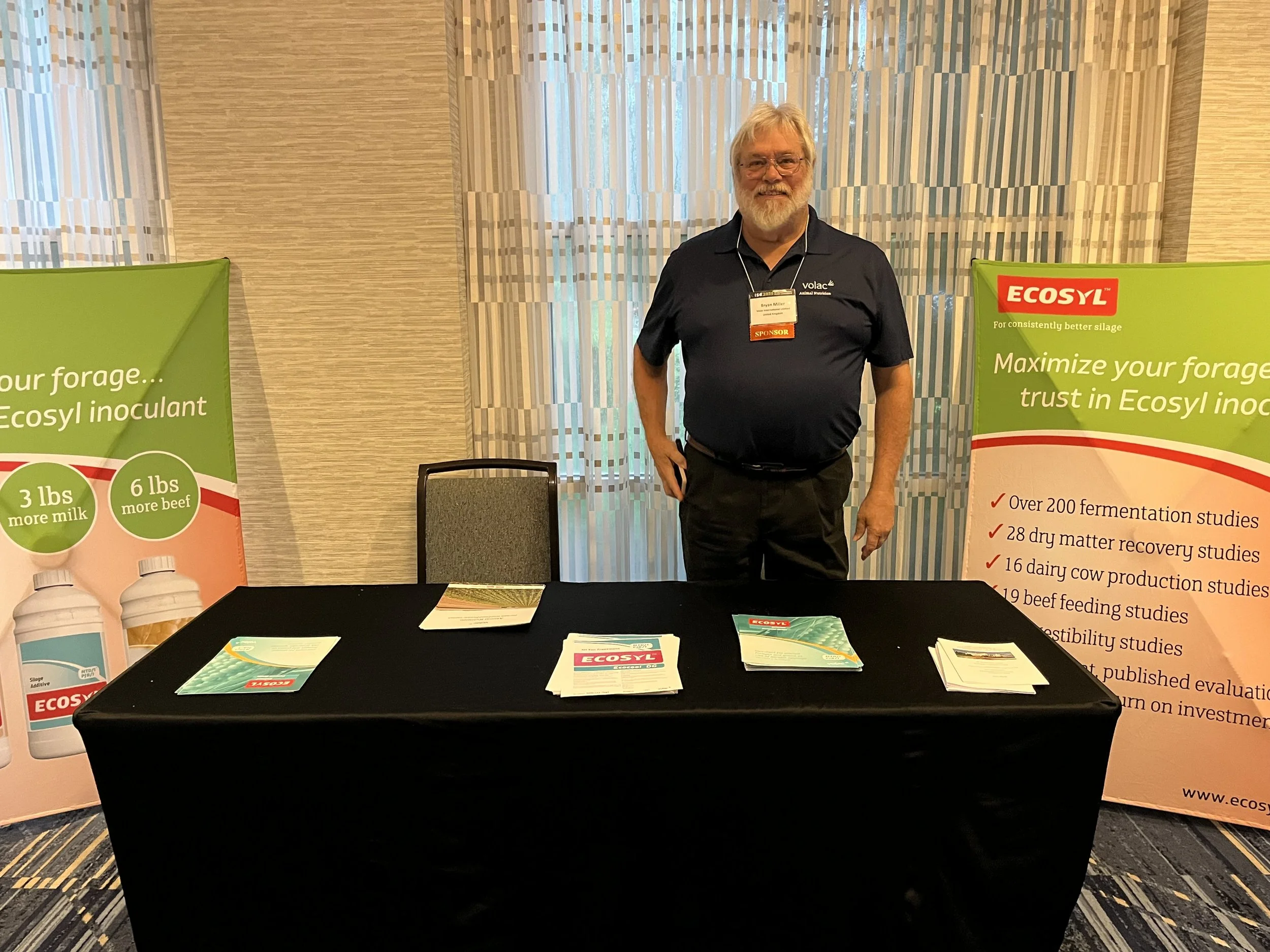The Volac team was proud to attend the XX International Silage Conference 2025, hosted by the University of Florida, as a Gold Sponsor and active contributor to the global conversation on forage preservation.
This global event brought together leading experts from around the world to share the latest advances in silage science, with discussions focused on efficiency, sustainability, and safety in modern agriculture. Notable speakers, including Prof. Antonio Gallo (UCSC of Piacenza), highlighted pressing challenges such as the occurrence of emerging mycotoxins, while other sessions explored innovations in inoculant technology, strategies for safer storage, and the use of advanced materials like oxygen barrier films to minimize spoilage.
Our Research & Development team was honoured to contribute to the scientific discourse by presenting four scientific posters.
1. Ryegrass Silage & Reduction of Methane during Ruminal Digestion
A collaborative study with Queen’s University Belfast investigated the effects of Ecosyl, Ecocool and L. buchneri strain PJB/1 on the fermentation quality of perennial ryegrass silage, as well as on a subsequent rumen fermentation efficiency. The study found that Ecosyl and Ecocool were most effective for silage preservation, leading to higher lactic acid concentrations and lower pH levels, and better preservation of dry matter compared to control. In the in vitro rumen analysis, the PJB/1 demonstrated the greatest potential for environmental sustainability by significantly reducing methane emissions by up to 64.96% after 24 hours digestion compared to control. Ecocool also reduced methane but to a lesser extent. The findings conclude that Ecosyl, Ecocool and PJB/1 inoculants can enhance silage fermentation and nutrient retention while also mitigating methane emissions, underscoring its potential for more sustainable livestock production.
2. Maize Silage Stability & Mycotoxin Control
In another poster, we presented a study on the impact of Ecocool silage inoculant on maize silage's aerobic stability, mycotoxin contamination, and digestibility after air exposure. Our researchers found that treating maize silage with Ecocool significantly improved aerobic stability by increasing acetic acid production, which in turn suppressed spoilage yeasts and moulds. After 95 days of fermentation and subsequent air exposure, this led to a 98% reduction in two penicillium mycotoxins: mycophenolic acid and roquefortine C, compared to control. Furthermore, the Ecocool-treated silage demonstrated significantly higher NDF digestibility, which has a potential to improve animal performance. The study concludes that applying Ecocool enhances the hygienic and nutritive quality of corn silage by improving aerobic stability and inhibiting mycotoxin production.
3 & 4. Preserving Protein in Lucerne Silage
Our last two posters summarised the research conducted in collaboration with Aberystwyth University and highlighted the effective strategies for preserving valuable protein in lucerne silage, a forage that is notoriously difficult to ensile effectively. One study investigated the impact of chop length, revealing that a shorter chop length improved silo packing density and fermentation. This resulted in lower concentrations of free amino acids, indicating reduced protein breakdown compared to a longer chop length. A second complementary study demonstrated the benefits of using Ecosyl silage inoculant. Inoculation significantly improved the fermentation process, leading to a lower pH, reduced ammonia, and importantly, higher overall concentrations of total and essential amino acids in the final silage. Together, these findings show that combining a shorter chop length with a proven silage inoculant Ecosyl can improve fermentation efficiency and preserve the amino acid profile, enhancing the nutritional quality of lucerne silage.
Our Research & Development team was met with great interest and sparked engaging discussions with fellow academics and industry professionals, reinforcing Volac’s role as a trusted science-driven partner. We left Gainesville inspired by the collective drive to advance silage innovation. The knowledge gained and the strengthened collaborations will continue to fuel our mission of turning cutting-edge science into practical, effective solutions for farmers worldwide.
Read the full scientific papers here.



